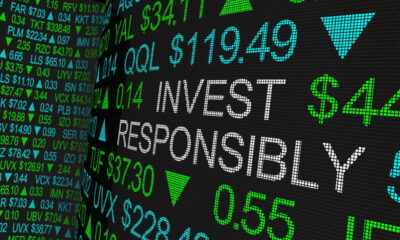

Economy
Why we’re supporting Sustainable September: Ecclesiastical Investment Management
Several organisations are helping us organise and underwrite Sustainable September, the month-long celebration of sustainability that you can reserve your tickets for now, before they go on general sale.
We are asking each of them to tell us why they are supporting the event. First up is Ecclesiastical Investment Management, a leading name in the socially responsible investment (SRI) world.
Why is Ecclesiastical supporting Sustainable September?
Ecclesiastical is very pleased to be supporting Sustainable September in its aim of raising the profile of responsible and sustainable investing amongst both the financial adviser and private client community. We are seeing increased interest in our Amity range of ethical funds and believe industry wide initiatives like this provide the information and guidance to meet this demand.
What do you hope to get out of the event?
We hope to see increased debate and conversation amongst both the investment community and the broader investment market, and ultimately for this area of the investment market to grow in size and profile. In the short-term, we would like to see advisers ‘ask the ethical question’ of their clients, both as a means to better understand their clients but also to ensure their investment advice best fits the values of those clients.
What does sustainability mean to you?
In the broadest sense, sustainability follows the Brundtland maxim that it “meets the needs of the present without compromising the ability of future generations to meet their own needs“. To that end, we are long-term investors that seek to invest in companies that will operate successfully in the interests of all of their stakeholders without compromising the future.
Why should individuals and businesses consider sustainability?
Resources are becoming ever more finite, and the world faces many inexorable challenges arising from a growing world population forecast to hit 9 billion by 2050. Resource constraint and depletion will put many business models at risk where these have make no attempt to mitigate resource risk, or fail to meet the challenges posed by climate change, water scarcity or drought. Business opportunities and the license to operate may increasingly be founded on those businesses that have proved themselves to be the most adept at meeting these challenges, and in meeting growing sustainability challenges.
Individuals have a pivotal role to play in helping shape how business engages with all its stakeholders. Companies which develop a long-term business model with sustainability at the core will be better placed to deliver long-terms return to both shareholders and customers. There has been a paradigm shift where business leaders no longer view sustainability as a cost base, it is seen as a profit centre – one that delivers strong returns to the bottom line.
Follow Sustainable September on Twitter (@SustSept), Facebook (facebook.com/sustsept) and through the dedicated LinkedIn group.
Further reading:
Introducing: Sustainable September


 Environment11 months ago
Environment11 months agoAre Polymer Banknotes: an Eco-Friendly Trend or a Groundswell?

 Features10 months ago
Features10 months agoEco-Friendly Cryptocurrencies: Sustainable Investment Choices

 Features11 months ago
Features11 months agoEco-Friendly Crypto Traders Must Find the Right Exchange

 Energy10 months ago
Energy10 months agoThe Growing Role of Solar Panels in Ireland’s Energy Future





























